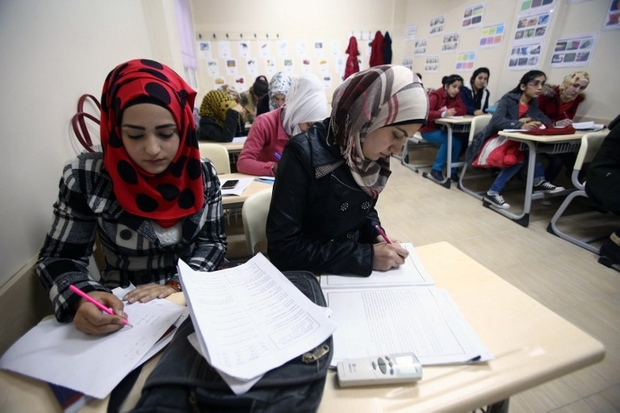Ankara – The possibility of naturalizing Syrian refugees, who have fled the war in their country to Turkey, has turned into a heated topic among Turkish parties with camps divided between those who support the measure and others that view it as a threat.
Turkish President Recep Tayyip Erdogan had proposed in July 2016 that the nationality be granted to Syrians, who possess assets that will benefit Turkey. This includes doctors, engineers, teachers and investors.
The case of naturalizing the refugees has not only been a contentious internal issue, but a “card used to pressure the European Union whenever a crisis emerges between it and Ankara.”
Turkey hosts around 3 million registered Syrian refugees, said a study by Hacettepte University, which recommended that “perceived traditional image of the refugees must be changed.”
It also recommended that Turks prepare themselves, at least psychologically, to accept the possibility that the majority of these refugees will likely remain in their country even after the war in Syria ends.
It explained that taking into consideration that 13 percent of the displaced live in refugee camps, the remaining live in cities and have grown accustomed to their new life, where they have established themselves and formed economic and social ties.
They have learned to speak Turkish and the locals have embraced their presence with the exception of a few minor incidents that do not reflect the general public’s view of the refugees, said the academic study.
Generally, the majority of refugee cases are resolved with naturalization or permanent residencies. The refugees’ return to their homeland is usually linked to short conflicts. In cases of ongoing conflict, such as the Palestinian-Israeli one, Palestinian refugees have not been granted the nationality of their Arab country of residence, with exception of those in Jordan.
Turkey has reaped economic benefits from the Syrian refugees where unemployment has dropped in cities that have welcomed them in great numbers, such as Kilis and Gaziantep in the South. This is at a time when other areas are witnessing high unemployment due to the country’s struggling economy.
Meanwhile, other studies noted that Syrian investments in Turkey have doubled since the conflict in the neighboring country erupted in 2011. According to figures from the Union of Chambers and Commodity Exchanges, the number of Syrian-owned companies in Turkey reached 4,500 at the end of 2016 with a net capital of 700 million Turkish liras or 180 million euros.
They revealed that one in four foreign investors in Turkey is Syrian.
The situation is bit more complicated on the political scene where Erdogan’s statements in July 2016 had a mixed reception.
Istanbul governor Vasip Sahin announced that the files of 2,000 Syrian families have been sent to the Interior Ministry to address the possibility of naturalizing them. Deputy Prime Minister Veysi Kaynak declared however that naturalization will not take place before the April 16 referendum.
Tensions are high in Turkey ahead of the April vote in which Erdogan is seeking a constitutional amendment that would shift the country’s system from a parliamentary to a presidential one, granting him sweeping powers.
The majority of Turkish parties, except the president’s Justice and Development Party (AKP), oppose the naturalization of Syrians. Head of the Nationalist Movement Party Devlet Bahceli described Erdogan’s proposal on naturalizing refugees as “irresponsible” and a threat to “social peace.”
Republican People’s Party MP Erdogan Toprak warned of “demographic changes” in several Turkish territories if the refugees were naturalized. He accused the AKP of seeking to naturalize refugees before the 2019 parliamentary and presidential elections in order to gain more votes in its favor.
“We may even see Syrian MPs or mayors” one day, he said.
Conservative parties, which reject the naturalization, believe that the AKP is using this file to gain votes in the April referendum.
On the European level, Ankara is embroiled in a dispute with the continent over a ban imposed by some countries on Turkish officials from carrying out campaigns in favor of next month’s vote.
Turkey threatened to “consider canceling” the immigration agreement it had signed with Europe in March 2016 in wake of the tensions. The deal calls for Turkey to impose stricter border restrictions on refugees.
The Republican People’s Party and pro-Kurdish Peoples’ Democratic Party had criticized how the Syrian refugee file has been dragged into the dispute with Europe.
Deputy chief of the parliamentary committee to develop ties with the European Union and Republican People’s Party, MP Ozkan Yalım, and deputy chief of the Peoples’ Democratic Party parliamentary bloc, Filiz Kerestecioglu, said the issue should not be part of “political compromises.”
